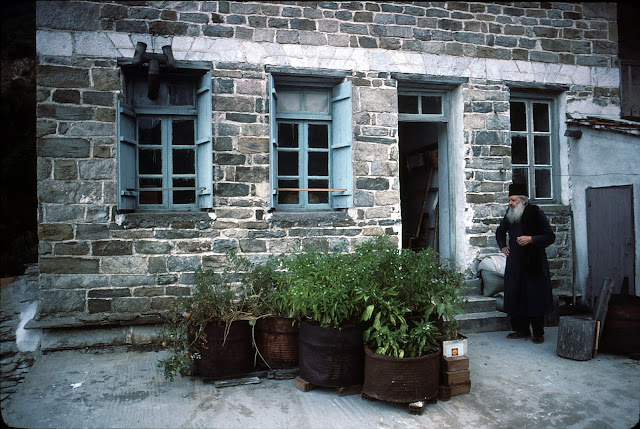Compared with Iviron, St. Paul's put on a lavish spread. While a monk read from Scripture, we enjoyed hard-boiled eggs, boiled potatoes, generous servings of cucumber-tomato-and-pepper salad (each plate garnished with a small salty fish like a sardine but larger), bowls of fasolada (bean soup) with more potatoes, and bread. There was also wine, but it was unpalatable, tasting more of the feet that had trod the grapes than of the grapes themselves.
 |
| St. Paul's Refectory |
To the accompaniment of prayers, everyone rose and lined up along the refectory's central aisle. Like a head of state reviewing his troops, the abbot, accompanied by the others from the head table, proceeded down the aisle at a dignified pace, paused at the door while a monk recited a short prayer, then exited. The rest of us followed in two parallel lines.
Outside the door, the abbot took a place immediately to the right. Opposite him to the left, two monks held a continuous bow as we filed past. When everyone was out of the refectory, the two bowing monks kissed the abbot's hand, still not raising their heads.
* * *
After dinner, I inquired about Father Andreas. The monk who had sat beside the abbot at dinner promptly led me up three flights of stairs to a private apartment. Following a knock on the door, there stood Father Andreas in his undershirt.
I had come unannounced, and he didn't recognize me at first. But when I explained who I was, he quickly recalled our meeting four years before.
His cozy apartment glowed warmly in the late-afternoon sun, which streamed through west-facing windows with views out to sea. A French door opened onto a small terrace overlooking the katholikon in the direction of Mount Athos.
 |
| Father Andreas on his terrace |
In bed, he prayed for help, directing his prayers to a cross hanging nearby. He crossed himself once, twice, and with the third cross came a loud knock at the door. It was a total stranger (not a monk) who had just happened by. The stranger went immediately for help. Father Andreas was transported to Athens where his treatment consisted simply of rest. When I saw him, he had recovered sufficiently to walk short distances, but one of his fingers remained completely numb.
After that episode, he returned to St. Paul's and took up residence in his pleasant aerie. He spent his days mostly sewing and reading. Meals were brought up to him. In a small glass bottle he kept an elixir, a root-based brew made from a formula issued by St. Nektarios (d. 1920), who was known for his curative miracles. Father Andreas claimed it had cured cancer in two people.
* * *
After our conversation I found my way back down the stairs in darkness and was assigned a bedroom to myself. It was simply furnished but tidy and clean, like a class D hotel. The lavatory down the hall, though still of the squat-and-shoot variety, was porcelain and was kept clean with running water. Everything bespoke good order and regular maintenance. Cenobiticism was on fine display at St. Paul's.
* * *
Rising at 6:00 and gathering my things, I found my way in darkness to the katholikon. Candles burned in a chapel to the side of the narthex; chanting emerged from further within. Finding the doors to the nave closed, I refrained from intruding on a service already underway. My sublime consolation was to sit outside the narthex and let the chanting bring the dawn.
As the monastery came to life I climbed the stairs to see Father Andreas one last time. We had only a few minutes before saying our good-byes, just enough for coffee and a photo on his little terrace in the dim light of the new day.
 |
| Good-bye |
No comments:
Post a Comment